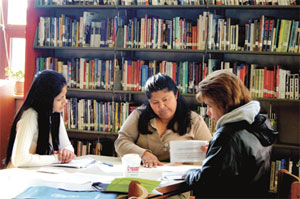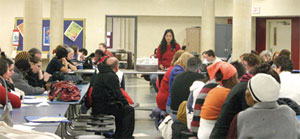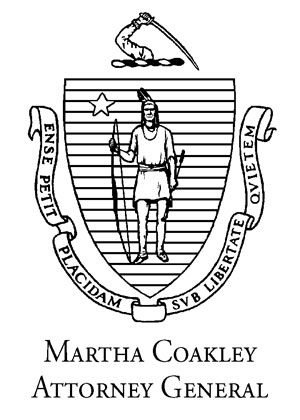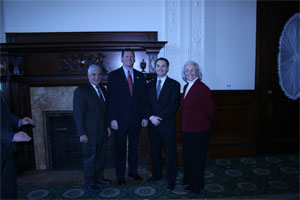High School mentor group crafts a PSA on depression By Julia Fairclough All you do is mooch off me every day," the father growled, gripping the wine glass and waving his free arm while his son cowered in the corner of the kitchen. "All you do is eat and play games. All you do is sit around the house. I'm not made of money, you know. Awww…just get out of my sight!" Sadly, for some teens, this is a familiar scenario. Most don't know how to talk about problems at home, and instead seek relief from alcohol and drugs. Or else they bury their feelings and isolate and become depressed. That is why members of the Somerville Positive Forces (SPF), a student group that works to prevent and address issues involving substance abuse, are creating a public service announcement (PSA) about depression in teenagers. "Are you going to cry now?" taunted Craig Leach, who teaches TV and media production at Somerville High School. Leach was playing the father. Dylan English, a junior, who played the son, walked off the set. It was a take. It was a chilly Tuesday afternoon in the high school library, but the atmosphere was warm with enthusiasm. "We (through the PSA) get to show people that although there is a problem with depression, there is a solution," said Sabrina Ozit, 16, who helped to collect the data from a 2007-2008 Somerville High School Health Survey about depression, which the group used for the PSA. The depression rate at Somerville High School is slightly higher than average, Ozit explained-at 31% versus 27% nationally-as she thumbed through the report. "We are the kids who understand (high school depression) more than adults, so we can offer realistic solutions," Ozit added. "Depression is beneath the surface, but a good friend would notice it and suggest that the person tell a counselor. Now that I've been in SPF, I realize that it's everyone's problem, and how to get help." The PSA entails a collaboration with Somerville Community Access Television (SCAT)-via its Next Generation Producers program-under the direction of Daniel Marques, SCAT's youth media and membership coordinator and Prince Charles, the programming coordinator and youth media instructor. The PSA brings viewers through the scenario of verbal and substance abuse, which can lead to depression and it offers three hot line numbers and how sufferers can receive help. It will will air in late March on Channel 3, on SCAT's media Web site, www.saymedia.blogspot.com and on the Next Generation MySpace page, www.myspace.com/nextgenerationproducers. The group gathers information from local resources, such as the school health survey, that would be beneficial to the community, said Lovelee Heller, the group advisor and Somerville Cares About Prevention employee. "It's the students who lead the process and choose the topics." SPF is a subgroup of Somerville Cares About Prevention. SPF will also create a PSA about marijuana abuse, another timely topic. According to the health survey, 2008 rates of substance abuse among high school students is similar to 2006. Cigarette use increased from 14 to 15% between those two years, and marijuana use from 19 to 21%. However, rates of substance abuse were lower in Somerville than in Massachusetts as a whole, according to the report (comparing 2008 to the most recent 2005 state data). For example, alcohol abuse among teens is at 48% statewide, but 37% in Somerville. Likewise, binge alcohol episodes were at 27% statewide, versus 21% locally. Tobacco use is at 4% statewide, versus 2% at Somerville High School, and marijuana use at 26% and 21% retrospectively. Twenty five percent of students reported being verbally or emotionally abused by a family member and 13% have witnessed family violence, according to the survey. Deepikah Bhargo, a junior, joined SPF because as an older sister preventing and educating about abuse issues is near and dear to her. "There needs to be communication between parents and children, which is why we want to educate everyone," she said. "There are many misconceptions about there, such as 'everyone drinks.' Not everyone does drink, but we need to educate those who do." A few steps away, Jingni Chen, a senior, worked the camera. This is her first time working with film. Who knows, maybe I'll continue, she mused, her attention then caught by a quick burst of laughter amongst the crew as they finished another take. "I went through some depression during my freshman year," Chen continued, when the crew took a quick break. "So I understand how it feels. It was hard for me to talk about it to others, aside from my sister. So I want to show others out there that you can talk to other people." Senior Paulo Gutierrez, who was working the microphone, enjoys getting to know other students who he would not ordinarily encounter in the halls of the high school. He found he enjoys working on a group project. Leach appreciates that the PSF students are stepping forward to be role models. It is more meaningful to hear how to get help for depression from a peer. It elicits a stronger message, he said. "I love how the project is youth development focused," Heller agreed. "They look at issues in the community where they can have a positive impact, which makes for more strategies in how to reduce underage drinking and substance abuse in their community. They have great ideas." Marques and Charles both enjoy their roles as teen program coordinators. The students are curious, creative and full of ideas. They embrace learning how to conceptualize, direct and film."It's a great thing to be a part of, to impact their lives and expose them to video," Marques said. In December 2008, SPF conducted its "sticker shock" program by working with local liquor store merchants to put special stickers on multi-pack alcoholic beverages and on liquor store bags. The 15,000 stickers reminded adults that they should not provide alcohol to anyone under the age of 21. Stores were given the option of displaying a sign with the same message in their windows or at their checkout counters. |
|||||||
| Classes will take place Mondays from 6 to 8 pm, starting February 9. To become an American citizen is a dream that many immigrants share. But it is not just a matter of having a document. There is important information that anyone interested in applying for citizenship should learn and some issues that must be resolved before applying. For nearly 40 years, the Massachusetts Alliance of Portuguese Speakers (MAPS) has been offering a variety of citizenship-related education and assistance programs that have helped thousands of foreign-born individuals to become Americans. This February, new citizenship classes will be starting at MAPS' Dorchester and Cambridge offices. The Citizenship Preparation course includes US civics and history, as well as English for Speakers of Other Languages (ESOL). It also teaches the students about the citizenship process. "It offers a complete preparation for the interview and the test the applicant will do. He or she will be ready and confident to pass," says Julia Evora, Coordinator of ESOL and Citizenship Classes. The course is divided into 12 weeks. At the Dorchester office, located at One Stoughton Street, classes will take place Mondays from 6 to 8 pm, starting February 9. To register, call 617-825-5897. At the Cambridge office, located at 1046 Cambridge Street, the classes begin February 12, and will take place every Thursday, from 6 to 8 pm. To register, call 617-864-7600. The cost per student is $30, including textbook fees, and is funded by a contract with the Massachusetts Office for Refugees and Immigrants. MAPS' Immigrant Social Services Program is also available to help Portuguese speakers complete their N-400 US Citizenship applications for a $20 fee. Mrs. Evora highlights the importance of citizenship for the immigrants: "If you become a citizen, you will be able to vote and have a voice in America's politics. You will also be more eligible for social benefits and will have access to many government jobs," she points out. MAPS is a private, nonprofit organization with six offices throughout greater Boston, Framingham and Lowell. The agency has provided health and social services to Portuguese speakers since 1970. For more information, please visit www.maps-inc.org. |
|
By William Tauro Last Wednesday January 21st Somerville Lion Zone Chair Ann Sabbey hosted the Zone speech contest between Arlington High Student Alessandra Bautze representing Arlington Lions Club and Cvetiva Popa of Somerville High School representing the Somerville Lions Club. The competition provides an opportunity for students to speak publicly on a designated topic. This year's topic: "How has modern media affected our lives?" The competion starts at the local club level and proceeds through levels of competition ending several months later with the statewide contest. Ms. Alessandra Bautze won the Zone speech contest and will go on to the Lions Mid Winter conference in February. The competition culminates with the five statewide district winners vying for the tile of BEST IN THE STATE. Congratulations to both Cvetiva Popa and Alessandra Bautze for their fabulous speeches. Thank you to the Speech contestant judges who volunteered their time: Tamela Roche, Lenore Hill and David Pap. |
||||
Helping make sense of financial aid forms By Meghan Frederico On Sunday, financial aid professionals came to Somerville High School and helped college-bound students and their families complete over 60 Free Application for Federal Student Aid (FAFSA) forms. Somerville was one of 26 sites across Massachusetts that provided FAFSA assistance as a part of College Goal Sunday, an event aimed at ensuring that all students have access to financial aid information. The organized sessions guided attendees through the 109-question form, the first step necessary to access federal student aid programs such as Pell grants, Stafford and Perkins loans, and federal work-study programs. For two hours, financial aid professionals from the Massachusetts Educational Financing Authority (MEFA) and the Massachusetts Association of Student Financial Aid Administrators (MASFAA) led a large group gathered in the cafeteria through the form, line-by-line. Meanwhile, multilingual volunteers from the Welcome Project's Liaison Interpreter Program of Somerville (LIPS) provided one-on-one assistance in the library upstairs. "It was a really nice opportunity for people whose families don't have experience applying to college" said Somerville High School senior Alisha Thapa, who was leaving with a fully-completed FAFSA. Samridha Rana, another senior at Somerville High, was happy to leave Sunday's event knowing that she can now shift her attention away from the FAFSA and onto making bigger choices, such as which photojournalism or media studies program she'd like to enroll in next year. Several attendees said it was helpful to be able to go over the form with professionals due to the complex nature of the form. "It's overwhelming," said Somerville resident Iona O'Brien, who had been through her son's application twice online before coming to the session. "Today clarified a lot of questions that I had." Somerville residents are not alone in their FAFSA-induced bewilderment. Arne Duncan, the newly appointed Secretary of Education, said at his Senate Confirmation Hearing, "I don't know if any of you have completed [a FAFSA] lately, but you basically have to have a Ph.D. to figure that thing out." Goal Sunday turnout at the Somerville location was slightly lower than last year, when it assisted with 81 FAFSA applications. Event organizers worried that this might be a result of the economic downturn, and hoped that the decrease is not an indication that students are giving up on applying. For those who still plan on filing the FAFSA, there are still plenty of helpful resources online, according to Northeastern University financial aid officers Amanda Abreu and Emir Morais, who volunteered through MASFAA. They advised to beware of for-profit websites, such as Fafsa.com (and other websites ending in .com rather than .org or .gov), that charge fees to process the online application. "We tell applicants that they shouldn't have to spend money to get money" said Jessica Belt, from the co-sponsoring non-profit MEFA, whose website (www.mefa.org) provides information on applying for financial aid in Massachusetts, as well as a free online tool to file the FAFSA. The line-by-line FAFSA tutorial viewed by attendees is also available online at www.collegegoalsundayusa.org |
|||||||
BOSTON – Attorney General Martha Coakley has filed legislation as part of her office's continued effort at tackling the ongoing mortgage foreclosure crisis that has gripped the Commonwealth. The first piece of legislation, An Act to Require Commercially Reasonable Efforts to Avoid Foreclosure, filed with Senator Susan Tucker and Representative Steven Walsh, would mandate loan modifications in certain circumstances. The second piece of legislation, An Act Regarding Community Leadership, Neighborhood Revitalization and Urban Violence Protection, filed by Attorney General Coakley, along with Senator James Timilty and Representative Barry Finegold, is designed to address the problem of abandoned properties that result from foreclosures, and the negative impacts they have on the Commonwealth's neighborhoods and economy. Attorney General Coakley announced the legislation in a speech this morning before the Greater Boston Chamber of Commerce Government Affairs Forum. "We hope that this legislation can provide for Massachusetts somerelief while we wait for action at the national level. The effects of the housing crisis have rippled through all sectors of our economy, and until we tackle the underlying problem of the subprime lending crisis, no bail out package, no matter how big, can appropriately stabilize our economy," said Attorney General Coakley. An Act to Require Commercially Reasonable Efforts to Avoid Foreclosure, aims to prevent additional foreclosures and would mandate loan modifications in certain circumstances. Specifically, the loan modification legislation requires that creditors take commercially reasonable efforts to avoid foreclosure upon mortgage loans securing homes that are owner-occupied. This would apply only to loans on principal residences, and to loans with certain risky features, such as interest-only loans, adjustable rate mortgages, and loans with short-term introductory interest rates. The legislation also provides a safe harbor for creditors to comply with this requirement of commercial reasonableness. It is time for new innovative tools to bring borrowers and lenders to the table. Clearly, some foreclosures are unavoidable, but each day we are losing opportunities to modify loans that are in the best interest of the lender, the homeowner, and the neighborhood," said Senator Susan Tucker (D-Andover). "Attorney General Coakley has made it a major priority to address the foreclosure crisis in Massachusetts, which has hit communities such as mine particularly hard," said Representative Steven Walsh (D-Lynn). "This legislation will benefit working families as well as creditors and I am eager to work with Attorney General Coakley towards its passage." Additionally, in an effort to address the problem of abandoned properties that result from foreclosures, Attorney General Coakley, along with Senator James Timilty and Representative Barry Finegold, has filed An Act Regarding Community Leadership, Neighborhood Revitalization and Urban Violence Protection, designed to address the problem and the negative impact it has on our neighborhoods and our economy. Thousands of foreclosures in communities large and small across the state have resulted in properties being abandoned, or left vacant. These properties, which can remain empty for months or years at a time, are susceptible to building code violations, dilapidation, and criminal activity such as copper stripping and theft, drug dealing, and even arson. Such issues not only threaten public safety, but they hinder law enforcements efforts to revitalize neighborhoods ravaged by foreclosures and to help communities regain economic stability. Senator Tucker also supports this bill. The legislation would do two things. First, it would create a two-year pilot program establishing a statewide abandoned housing registry housed within the Attorney General's Office. The registry would be known as the Massachusetts Abandoned Property Registry, or MAP, and would serve as a state-wide registry for vacant and foreclosed properties. Under the legislation, all property owners, including lenders, trustees, and service companies, would be required to register and properly maintain vacant and foreclosed properties. Second, the legislation would establish a statewide Second-Hand Metal Registry. One of the public safety side effects of the foreclosure crisis is the increase in copper and scrap metal being stolen from abandoned properties. An individual who steals scrap metal from a property is likely selling it to a junk dealer for quick cash. Such illegal practices are roadblocks to fighting the foreclosure crisis because they prevent homes from selling and therefore have a detrimental effect on our neighborhoods. "Abandoned properties and the resulting thefts of copper and other metals are ripple effects of the foreclosure crisis that are affecting communities statewide. In fact, Senate President Therese Murray has also expressed her concern about this issue, and we look forward to working with her to find effective solutions," said Attorney General Coakley. Under the legislation, all junk dealers and pawn brokers would be required to register and license their business with the state. Such a registry will not only prevent theft of scrap metal from abandoned properties to ensure that the properties will be sold and occupied, but it will also provide law enforcement with the necessary tools to bring metal thieves to justice. "With our economy struggling we have seen dramatic levels of theft throughout the Commonwealth. From copper piping and building materials in abandoned or foreclosed homes and construction sites, to cell phones and GPS devices, and even municipal property with high market-valued metal content; everything has become a target," stated Senator Jim Timilty (D- Walpole). "We need to provide our law enforcement officers with more tools to prevent these crimes. It is my sincere belief that with this database we will prevent crime and make our neighborhoods safer, and I look forward to working with Attorney General Coakley to pass this legislation." "Abandoned houses can bring down a neighborhood, we need to make sure we are aware of what is out there," said Representative Barry Finegold (D – Andover). In addition to filing this legislation, Attorney General Coakley is working to expand her office's Abandoned Housing Initiative. This initiative was developed in the mid-1990's in response to complaints about crime and safety issues imposed by one or two abandoned homes in an otherwise viable neighborhood. Members of the Attorney General's staff work with municipal inspectional services to identify properties that are abandoned and therefore a threat to the neighborhood. By using the enforcement authority of the state sanitary code, the Attorney General's Office can step in when a property is in violation of those codes and offer the owner the chance to rehabilitate the property. If the owner cannot be located, the Attorney General's Office then works with the housing court to appoint a receiver who will rehabilitate the property. The Attorney General's Office recommends to the court a receiver who is committed to improving the community. The proposed abandoned property registry, if passed, would improve this process as municipalities would be able to identify who is responsible for a property and to enforce sanitary codes. Since taking office in January 2007, Attorney General Coakley has made addressing the foreclosure crisis a priority of her administration. In addition to the legislation announced today, the Attorney General's Office has brought several civil lawsuits- including a lawsuit filed in Octobe In addition to these initiatives at the state level, the Attorney General's Office continues to take a leadership role among the states in advocating for action at the federal level. Last month, Attorney General Coakley, along with Attorney General Tom Miller in Iowa, led a group of over 20 Attorneys General in urging U.S. House and Senate Leadership Congress to amend the U.S. Bankruptcy Code to permit federal Bankruptcy Courts to protect families from foreclosure. Last week, Attorney General Coakley submitted testimony to the U.S. House Judiciary Committee, which is considering legislation to amend the bankruptcy code. For more information about the Attorney General's foreclosure prevention efforts, please visit www.mass.gov/ago. |
|||
BOSTON- Middlesex District Attorney Gerry Leone met with members of the Massachusetts Legislature on January 22, including Representative Paul Donato, Representative Carl Sciortino, and Senator Patricia Jehlen to discuss legislative priorities for 2009. At a State House meeting attended by 35 legislators and members of their staff from throughout Middlesex County, Leone highlighted his second year in office, outlined school safety and domestic violence prevention programs that can be utilized in each community, and discussed his legislative priorities for 2009. The meeting was held as a way to continue to build communication between the Legislature and the District Attorney's Office, while also forming the basis for possible future partnerships on pieces of legislation and other initiatives. Among the issues discussed as a priority for 2009 included school safety, Internet safety, and preventing instances of domestic violence. |
|||
| Wednesday, January 28, 2009: Boston, MA – Today, Massachusetts' restaurant industry leaders expressed outrage at the Patrick Administration's call for an increase on the state sales tax on meals as well as the creation of a new local option meals tax.
"This proposal singles out restaurants at a time when they can least afford it!" said Peter Christie, CEO of the Massachusetts Restaurant Association. The Governor's proposal would raise the Massachusetts sales tax for restaurant meals to 6% and also allow cities and towns to impose a new 1% local option meals tax. This controversial proposal takes more dollars from residents striving to make ends meet. It taxes them on the very food that they eat as more and more people eat out, not as a luxury, but as a lifestyle necessity. The restaurant industry is concerned that a tax increase on citizens is counterproductive given the current economic conditions. Presently, meals eaten away from home are subject to our state sales tax. "To single out restaurants for this 40% hike is blatantly unfair. Our industry, not unlike the automobile industry, is reeling from the economic downturn," Christie said. "Would anyone suggest targeting automobiles for a local tax? Of course not, but that is exactly what the Administration is suggesting to us!" Overall, restaurants in the Commonwealth of Massachusetts employ nearly 10% of the total state-wide workforce. They collected more than $644 million for the general fund last fiscal year. "Restaurants support countless local community charities and civic organizations and play an important role in revitalizing most neighborhoods in our cities," Christie said. While many owners are struggling to survive, restaurateurs are now even more concerned about their future as this tax would make it even more difficult to survive. The Massachusetts Restaurant Association, and the 5,000 restaurants that it represents, vows a fight on this issue. To join in this struggle, please call the MRA at 508-303-9905. |
|
Bob Katzen – Beacon Hill Roll Call Gov. The governor's proposal also The governor's package also proposes imposing |
|||
| Residents Must Move Automobiles From City Lots by 7:00 P.M. Wednesday
The City has lifted its snow emergency regulations effective 5 P.M. this evening (Wednesday). Residents parked in municipal or school lots during the snow emergency have a two-hour window starting at that time in which to move their vehicles. Cars still parked in city lots at 7 P.M. tonight may be subject to ticketing and towing. Residents, landlords and business owners are required by city regulations to shovel their sidewalks but may not shovel snow into the street. For additiional information, please call 311. |
|
























Reader Comments